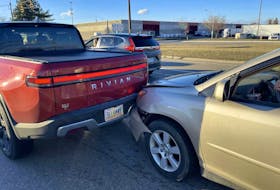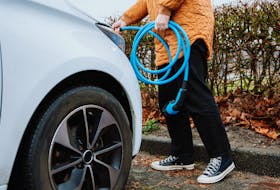You’re at the dealership. You’ve found the car, you’ve found the colour, you’ve got your price. It’s just about a lock. “Oh, and does the car come with that front collision control I saw in your commercials?”
The salesperson’s reply comes back, “It does if you order the Serendipity Package, which also comes with a sunroof that would make an aquarium jealous.”
Ugh. For some of you this situation isn’t hypothetical. You’ve been there. Manufacturers demonstrating just about everywhere they can the newest and best safety technology their models have got – as they should – and then, when you go new-car shopping, keeping it just out of your reach unless you jump up the food chain to the trim levels that actually sport them.
A recent study by Consumer Reports argues this is the wrong way to get cutting-edge safety features into the right hands — that is, everyone’s.
A new bill, The Moving Forward Act, before the U.S. House of Congress wants to mandate auto manufacturers make standard on all their cars any available safety features, a motion that could save, by the study’s estimation, half of all road deaths annually in that country.
In 2018, there were 36,560 road fatalities; in Canada, it was 1,743. By reducing the number of collisions, and furthermore reducing the severity of those that do happen; and by turning fatalities into major injuries, and major injuries into minor ones, existing technology could save billions in human and property damage — if this existing tech was in every car.
The Consumer Reports release highlights what has become something of an impasse: we’re all so convinced that autonomous cars will save us from ourselves and drive road collisions and deaths to a promised zero that we’re overlooking the fact we have enough semi-autonomous driving safety features available to almost do that already. What are we waiting for?
Fully autonomous cars cruising our roadways will not be here by next Tuesday. Nor a year from now. Not even 10. The required infrastructure is a massive undertaking, outside of the development of whatever little wheeled cocoons end up cheerfully ferrying us about. But if we can’t make people buy electric cars — if we can’t even get them to understand they shouldn’t, in most cases, be buying oversized SUV and pickups — do you really think we’ll be able to get them to give up all driving control?
I know people who drive their cars for 25 years or more. If I were told tomorrow my next vehicle purchase would by default be an autonomous one, I’d probably hang on to my current car for as long as I could. Same with electric powertrains versus combustion engines. This is the human behaviour we keep forgetting to factor into the autonomous car conversation, and quite possibly the most important one.
The study stands the question on its head. Forget yearning for autonomous vehicles. Instead, keep everyone on the road safe by requiring automakers fit to every car the known, proven safety features that save lives. Not as a trim level, not at a premium — standard.
In Canada, seat belts became mandatory in all cars on January 1, 1976. Daytime running lights, December 1, 1989. Backup cameras, May 1, 2018. For ABS and stability control systems, it was the 2012 model year. Many manufacturers were pushing these safety features into their lineups long before they were mandated; the current bill before Congress is a big push to get the best we have into every car on the road at the production level.
This matters to Canadians, as we, for the most part, ride on America’s coattails with regards to vehicle design and regulation.

Airbag regulation is an exception: they are not mandatory in Canada but have been in the U.S. since 1998.
You’re technically allowed to fit a switch to turn them off, but thankfully most of us view them as a requirement, not a nuisance.
Toyota has twigged early and offers “Toyota Safety Sense (TSS) … standard on virtually all Toyota models.” TSS is a safety bundle including pre-collision system with pedestrian detection, dynamic radar cruise control, lane-departure warning and lane tracing, and automatic high-beams. It will even warn you about speed limits and stop signs. It’s not that nearly every auto manufacturer doesn’t have these technologies; it’s that Toyota is acknowledging that wanting these in your new vehicle isn’t the same as wanting low-profile tires or a spectacular stereo system. You shouldn’t have to opt-out.
Various brands have versions of this for 2020. Subaru’s excellent EyeSight Driver Assist is standard on its Foresters, Ascents, Outbacks and Legacies. For their other models, you have to advance your trim level up from base. Nissan’s comprehensive Safety Shield 360 is standard on its Leaf, Altima, Kicks, Qashqai, Titan and Sentra and the ‘21 Rogue. Acuras have advanced safety features as standard almost across the board; Buick, on the other hand, has just one vehicle (Encore GX) where you don’t have to open your wallet to reach higher. Hyundai kits out well; Jeep, less so. Consumer Reports has a great chart if you want to reference everything on the market.
The point is, we have the tools. In the past, the government has mandated features proven to save lives. The current technology is already making our roads safer (unless you’re a pedestrian, but that’s a whole other column), and delays in deciding all drivers deserve it is wasting time. Waiting around for autonomous cars to get here is also wasting time. Instead of wondering “are we there yet?” we should recognize that where we are could be pretty damned great.
I hope the Moving Forward Act does just what its name says.
Copyright PostMedia Network, 2020









